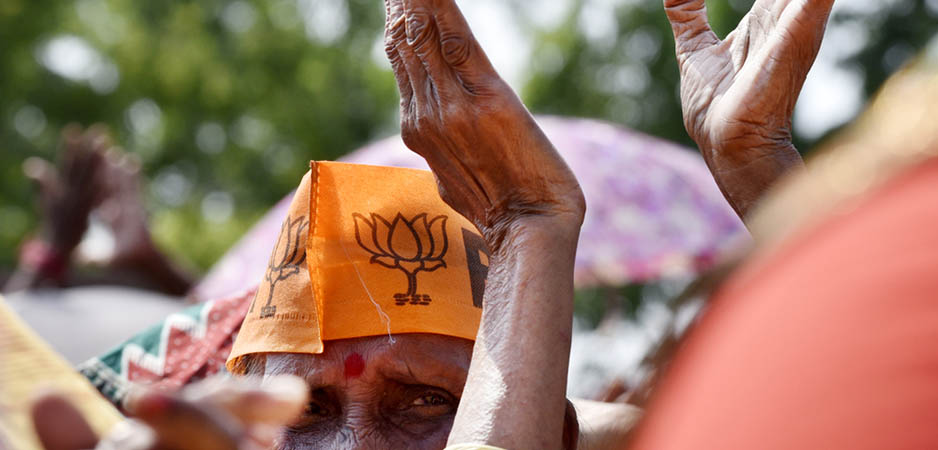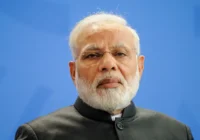Revulsion for corruption and nepotism makes Indians vote for a leader with humble roots despite his poor track record and authoritarian tendencies.
In April, this author called Indian Prime Minister Narendra Modi’s economic record abysmal. Yet he has now been re-elected with a thumping majority. His ruling Bharatiya Janata Party (BJP) has increased its tally from 282 to 303 of the 543 seats in the Lok Sabha, India’s lower house of Parliament.
Not since Indira Gandhi of the Indian National Congress has the country had such a powerful leader. So, what does Modi’s victory mean for India and the world?
THE VIEW OF THE FOREIGN PRESS
Newspapers and television channels from the Anglo-Saxon world are not thrilled with the outcome of the election. They have long viewed the BJP with suspicion and Modi with hostility. His resounding victory has aroused unusual pathos in London, New York and elsewhere.
The Guardian has deemed Modi’s victory as “bad news for India and the world.” It sees Modi as yet another nationalist populist demagogue who is pro-business, anti-minority and untruthful. The Guardian sees the BJP as a conservative, misogynistic and upper-caste party. As per this venerable left-leaning British publication, the victory of the Modi-led BJP is “bad for India’s soul.”
The Economist, the center-right British magazine of 1843 vintage, appositely eschews the spiritual language of its left-leaning counterpart. Yet even it cannot avoid spiritual references. The Economist features a photo of Modi meditating in saffron in the stunning backdrop of the snow-capped Himalayas. Calling him a “half Olympian god and half kung fu wizard,” it pays tribute to Modi’s charisma but says he is “a vessel of anger.” Unlike The Guardian that curiously reposes faith in the Nehru dynasty and exhorts it to rethink its strategy, The Economist argues that the BJP’s “opponents aided their own defeat.”
The New York Times published an editorial by the noted novelist Pankaj Mishra. He claims that Modi has seduced India with envy and hate. The writer passionately argues that Modi won thanks to “violence, fake news and resentment.” Mishra aptly diagnoses why Modi won. He points out that India is “a grotesquely unequal society” riven “by caste as well as class divisions” where dynasties dominate both politics and Bollywood. In such a society, Modi’s humble roots are seductive to ordinary voters.
Mishra astutely observes that Modi has exploited the resentment against India’s “metropolitan ruling class.” This class has “such Godlike aloofness” that it leaves most Indians stranded “in history while itself moving serenely toward convergence with the prosperous West.” Modi’s “rhetoric of meritocracy and lusty assaults on hereditary privilege” is intoxicating to India’s toiling and suffering millions.
The writer damns Rahul Gandhi, the grandson of Indira and the leader of the Congress party, as “a live mascot of India’s defunct dynastic politics and insolvent ideological centrism.” He bemoans Modi’s unleashing of the Nietzschean “men of resentment” with their “whole tremulous realm of subterranean revenge, inexhaustible and insatiable in outbursts.” Mishra blames Modi for the “savage assault on not just democratic institutions and rational discourse but also ordinary human decency.” Modi’s victory makes him “fear the future.”
THE SENTIMENT AT HOME
Even as the foreign press largely takes the view that Modi’s election might not entirely be a good thing, most people at home are trumpeting the dynamism of India’s democracy. To his credit, Gandhi has conceded defeat. So have other parties. A vast majority of observers agree that the Indian elections were free and fair. For all its faults, the world’s largest democracy seems to be more functional than Brexit-ridden Britain or the deeply-divided US, homes to The Guardian, The Economist and The New York Times.
Of course, many Indians worry. Most Muslims feel marginalized and are rattled by Modi’s second victory. Many of India’s finest public servants fear the further decline of the country’s fragile institutions. Others worry that Modi’s incompetent cronies might drive the economy into deep recession. Some fear war with Pakistan or even China. And a few worry that the country might split apart.
Party colleagues from Kashi gave me the official certificate of election from Varanasi Lok Sabha constituency!
Feel happy to be representing one of the oldest and most vibrant centres of Indian culture. pic.twitter.com/Ijh8YBUvhU
— Narendra Modi (@narendramodi) May 24, 2019
There are good reasons for such worries. Yet they are dwarfed by one big issue. Indians have voted against their metropolitan elite. In its fulminations, the foreign press forgets that Modi is the first backward caste prime minister of India who began life as a chaiwala, selling tea by the railway station. Voters resonate with this. They no longer identify with Gandhi, the fifth-generation, half-Italian scion of an incorrigibly corrupt dynasty.
Mishra is right about Rahul Gandhi’s uselessness. The dynast lost his parliamentary seat of Amethi, hitherto an impregnable family fiefdom. However, Mishra fails to realize a key phenomenon sweeping the country. Indians no longer buy into the myth of Jawaharlal Nehru, the first prime minister and Rahul’s great grandfather. Unlike George Washington or Nelson Mandela, Nehru did not hand over power to a successor. India’s dapper leader blundered horribly on China and was responsible for India’s catastrophic defeat in 1962. Yet he failed to resign and died in office. Finally, Indians are questioning his legacy not only vis-à-vis China, but also the state of Jammu and Kashmir.
Indira Gandhi, Nehru’s daughter and Rahul’s grandmother, threw every opposition leader and independent journalist into jail when she declared the Emergency in 1975. Rajiv Gandhi, her son and Rahul’s father, had his name dragged through the mud in the Bofors gun scandal. In the age of WhatsApp, Facebook and YouTube, powerful videos showing the murky past of the Nehru dynasty have reached millions, often spiced up with rumors, exaggerations and even untruths.
This is in stark contrast to the time when this author was growing up. Back then, the legend of the Nehru dynasty ran strong. It was perpetrated through an elaborate network of patronage. Humanities departments in Indian universities and the English-speaking media supported the dynasty overtly or covertly. The leading humanities school was suitably named Jawaharlal Nehru University. Many leading academics and journalists in India were dynasts themselves. They identified with the Nehru family and scorned the rough-edged upstarts from small towns who spoke English with an absolutely godawful accent.
To borrow an idea from Italian philosopher Antonio Gramsci, the Nehru family benefited from cultural hegemony for decades. This author remembers fellow schoolchildren offering prayers to members of the Nehru clan. Sadly for Rahul Gandhi and the Congress party, deference to dynasties has declined fast. They may still command wealth and power, but Indians want ladders of upward mobility. Modi symbolizes this desirable ladder while Gandhi personifies the hated glass ceiling.
Many Indians delight in the fact that Modi is a bachelor with no children and does not promote his family. This makes him immune from what they call the “Dhritarashtra syndrome,” a term named after a character in India’s greatest epic, The Mahabharata, who was blind and blindly loved his son. Nepotism is the bane of Indian society, and the spiritual bachelor with few worldly attachments has powerful appeal.
It is important to note that almost all relatives of this author have voted for the BJP even when they do not like Modi. They cannot stand the prospects of the “weak, vacillating and vacuous” Rahul Gandhi as prime minister. The foreign press misses the intensity of this emotion against entrenched privilege in a country where more than 65% of the population is below 35.
THE MESSY AND MIGHTY CHALLENGES AHEAD
As in the days of Indira Gandhi, this election has been a presidential election, not a parliamentary one. Like Indira, Modi believes in a strong and expansive state. This author has termed his economic policy as one of “Sanatan socialism,” a pun on Sanatan dharma that devout Hindus use to describe their faith. Like Nehru’s Fabian socialism, Modi’s Sanatan socialism is failing too.
The agricultural sector is in a funk, industrial production is declining, small enterprises are dying, jobs are vanishing and even consumption is falling. The government may trumpet healthy growth figures that seduce the International Monetary Fund, but it hides the painful reality that the economy might have contracted. As the author observed last month, the huge informal economy has collapsed.
Once, James Carville coined the term, “the economy, stupid.” In 1992, it led to George H.W. Bush’s defeat and Bill Clinton’s victory in the US. In 2019, it had no effect on Modi. That does not mean it will not affect him in 2024 or later. Indians still repose faith in Modi and have great expectations. They want prosperity, jobs and justice. It is impossible for any elected government to deliver them without reforming India’s crumbling postcolonial apparatus of the state.
More than 15 years ago, this author resigned from civil service because of “the corruption, inertia and inefficiency” in the government. Since then, matters have got worse. Selection, training and evaluation of bureaucrats have ossified. Sycophancy, not competence, determines upward mobility in government. As a result, policy briefs are written awfully and laws are drafted terribly.
 In fact, India functions through rule by law instead of rule of law. India has one of the worst police-population ratios and millions of pending cases lie pending in the courts. When Modi was elected in 2014, Kiran Bedi and a few other citizens, including this author, petitioned his government to institute long overdue police and judicial reforms. Till date, Modi has not cared for reforms. Instead, he has played political football with the Central Bureau of Investigation and interfered in an ad hoc manner in the functioning of the judiciary.
In fact, India functions through rule by law instead of rule of law. India has one of the worst police-population ratios and millions of pending cases lie pending in the courts. When Modi was elected in 2014, Kiran Bedi and a few other citizens, including this author, petitioned his government to institute long overdue police and judicial reforms. Till date, Modi has not cared for reforms. Instead, he has played political football with the Central Bureau of Investigation and interfered in an ad hoc manner in the functioning of the judiciary.
In 2019, India is increasingly a land of irreconcilable incongruities. It talks tough but Indian defense forces are still short of officers. Many of its politicians and citizens dream of world power status but the country faces a shortage of diplomats, of which it has far too few in the first place. The privatization of education, health care and public services is proceeding at an alarming pace. The Indian bureaucracy continues to be exploitative and extractive. If one is not in the government then one is up against it unless, of course, one can buy it.
Modi’s way out of this morass has been to rule like a strongman, riding roughshod over admittedly highly imperfect institutions. It is eerily reminiscent of Indira Gandhi who began the post-independence decline of Indian institutions. In his first term, Modi’s cabinet was full of pygmies. Like Indira, he is fond of sycophants and has appointed one as the governor of the Reserve Bank of India. There is real fear that his second term might be more of the same, or much worse.
Indira weakened India’s economy, eviscerated her own party and, as mentioned above, decimated the nation’s institutions. She perpetuated a personality cult, which led a crony to declare, “Indira Is India, India Is Indira.” Even Shashi Tharoor, a palace poodle of Rahul and a Congress MP, could not resist calling Indira Priya Duryodhani. Those unfamiliar with The Mahabharat might be interested to learn that Duryodhan was the epic’s grand villain and the son of Dhritarahtra.
With Prime Minister Modi’s resounding victory, one hopes history is not repeating itself either as a tragedy or as a farce. India cannot afford another Indira. It needs efficient, accountable and robust institutions, not more dynastic worship or another personality cult.
The views expressed in this article are the author’s own and do not necessarily reflect Fair Observer’s editorial policy.
Support Fair Observer
We rely on your support for our independence, diversity and quality.
For more than 10 years, Fair Observer has been free, fair and independent. No billionaire owns us, no advertisers control us. We are a reader-supported nonprofit. Unlike many other publications, we keep our content free for readers regardless of where they live or whether they can afford to pay. We have no paywalls and no ads.
In the post-truth era of fake news, echo chambers and filter bubbles, we publish a plurality of perspectives from around the world. Anyone can publish with us, but everyone goes through a rigorous editorial process. So, you get fact-checked, well-reasoned content instead of noise.
We publish 2,500+ voices from 90+ countries. We also conduct education and training programs
on subjects ranging from digital media and journalism to writing and critical thinking. This
doesn’t come cheap. Servers, editors, trainers and web developers cost
money.
Please consider supporting us on a regular basis as a recurring donor or a
sustaining member.
Will you support FO’s journalism?
We rely on your support for our independence, diversity and quality.






